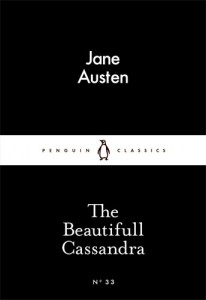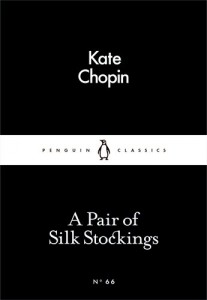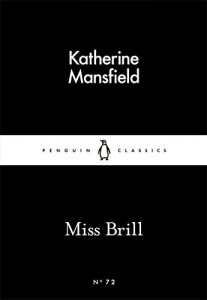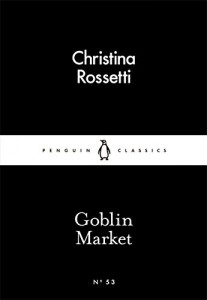Penguin Little Black Classics
Reviewed by Siân Miles
To mark its eightieth birthday this year, Penguin Books has selected eighty of its best titles to republish as tiny taster books, retailing at eighty pence apiece.
In doing so, they make available, at extremely low cost, examples not merely of European, nor even Western, but of an entire world literature. A boxed set of all eighty is planned for publication either in May or later in 2015.
Of the eighty texts, a tenth or so are by women writers, very largely though not exclusively from the nineteenth and early twentieth century. These are the volumes here under review. They derive from lesser-known works and contain some appetizing titles not lacking in humour and irony; Mary Kingsley’s contribution, for example is entitled A Hippo Banquet, Kate Chopin’s A Pair of Silk Stockings. Christina Rossetti’s samples include the wryly macabre A Frog’s Fate. Emily Bronte is represented by 30 or so poems in high Victorian Gothic mode, somewhat self-consciously attempting musicality with sadly mawkish results.
In marked contrast, Katherine Mansfield’s Miss Brill, is a literary version of an Impressionist painting. Set in a French seaside park on a Sunday afternoon, it traces the thoughts and feelings of a modest teacher of English as she identifies the tiny, illuminated fragments of her exterior world and makes revelatory sense of them: They were all on stage. They weren’t only the audience, not only looking on; they were acting. Even she had a part and came every Sunday. No doubt someone would have noticed if she hadn’t been there; she was part of the performance after all. How strange she’d never thought of it like that before! And yet it explained why she made such a point of starting from home at the same time each week – and it also explained why she had such a queer, shy feeling at telling her English pupils how she spent her Sunday afternoons.
Her delight in thus finding inclusiveness is echoed in Kate Chopin’s A Pair of Silk Stockings whose protagonist, the struggling, widowed mother of four youngsters, momentarily rediscovers the joys of hedonistic pleasure: …a young girl asked her if she wished to examine their line of silk hosiery. She smiled, just as if she had been asked to inspect a tiara of diamonds with the ultimate view of purchasing it. But she went on, feeling the soft, sheeny luxurious things —with both hands now, holding them up to see them glisten, and to feel them glide serpent-like through her fingers. The purchase of the silk stockings emboldens her to re-experience an important aspect of the reason for living which her currently straitened circumstances were in danger of obscuring: While waiting to be served she removed her gloves very leisurely and laid them beside her. Then she picked up a magazine and glanced through it, cutting the pages with the blunt edge of her knife. It was all very agreeable. The damask was even more spotless than it had seemed through the window, and the crystal more sparkling.
 Fellow-American Edith Wharton’s Mrs Manstey’s View extends the theme of the diurnal radically reversed. Mrs Manstey is an elderly New York boarding-house lodger living a solitary yet happy life sustained for the most part by the simple pleasure of observing the world from her window. When this is threatened by the construction of an all-obscuring extension to the house opposite, she takes drastic, dramatic action and dies smiling.
Fellow-American Edith Wharton’s Mrs Manstey’s View extends the theme of the diurnal radically reversed. Mrs Manstey is an elderly New York boarding-house lodger living a solitary yet happy life sustained for the most part by the simple pleasure of observing the world from her window. When this is threatened by the construction of an all-obscuring extension to the house opposite, she takes drastic, dramatic action and dies smiling.
The Kingsley collection takes readers to Africa where Fight with a Leopard is set, reflecting a very British attitude in a tone of comical understatement: I may remark that my nervousness regarding the big game of Africa is of a rather peculiar kind, I can confidently say I am not afraid of any wild animal—until I see it—and then, well I yield to nobody in terror; fortunately as I say, my terror is a special variety, fortunately because no-one can manage their own terror. You can suppress alarm, excitement, fear, fright and all those small-fry emotions but the real terror is as dependent on the inner make of you as the colour of your eyes or the shape of your nose; and when terror ascends its throne in my mind I become preternaturally artful and intelligent to an extent utterly foreign to my own nature, and save, in the case of close quarters with bad, big animals, a feeling of rage against some unknown persons that such things as leopards, elephants, crocodiles &c should be allowed out loose in that disgracefully dangerous way, I do not think much about it at the time.
The same humour pervades many of the twenty poems by Christina Rossetti, but with Elizabeth Gaskell’s The Old Nurse’s Tale and Charlotte Gilman Perkins’s The Yellow Wallpaper we are plunged back into the ghostly darkness in which women were and sometimes remain cruelly  imprisoned.
imprisoned.
It is ironic to reflect on the expansiveness of emotion, both happy and sad, expressed millennia earlier by a society of women living on a Greek island and reflected in the poems of Sappho. These blow a refreshing Aeolian breeze into the collection and ventilate it with a sensuality and exuberance still heard in the voice of her compatriot, our near-contemporary Cavafy. The boldness of her concision bespeaks huge trust in the reader and forms a timeless bond with both straight and gay. In Troy we read:
Some call ships, infantry or horsemen
The greatest beauty earth can offer;
I say it is whatever a person
Most lusts after.
Showing you all will be no trouble
Helen surpassed all humankind
In looks but left the world’s most noble
Husband behind.
Coasting off to Troy where she
Thought nothing of her loving parents
And only child but, led astray…
And I think of Anaktoria,
Far away…
And I would rather watch her body
Sway, her glistening face flash dalliance
Than Lydian war cars at the ready
And armed batallions.
It is the spirit of Greenham Common as fresh and alive as ever. Brilliantly translated by the delightfully-named Aaron Poochigian. Who could wish for more?
(This bookoxygen reviewer’s contribution to Penguin’s Little Black Classics is Femme Fatale, a quartet of Maupassant tales earlier published as A Parisian Affair & Other Stories.)

